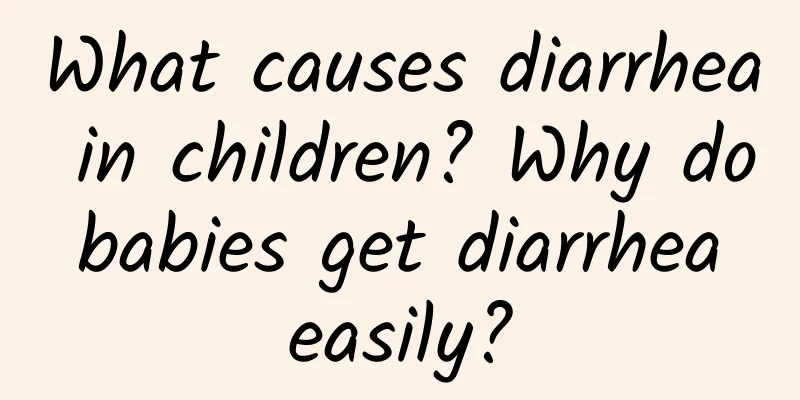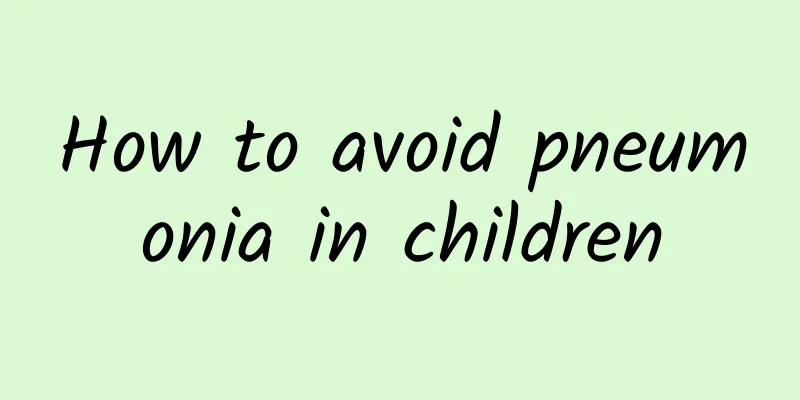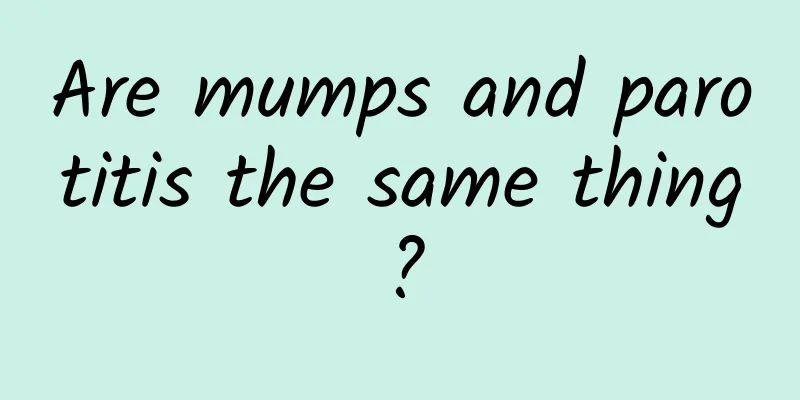What causes diarrhea in children? Why do babies get diarrhea easily?

|
Many people are prone to diarrhea. Adults may recover more easily from diarrhea, but children may not recover as their digestive ability is poor and their resistance is weak. So, what causes frequent diarrhea in children? 1. Autumn diarrhea Autumn diarrhea is mainly caused by rotavirus infection. It is more common in children aged a few months to six months from September to November in autumn. The onset is relatively rapid, accompanied by fever, runny nose and vomiting. There are frequent bowel movements, about 10 times a day. The stool is egg-drop-shaped or has more white water. The stool has no odor. 2. Escherichia coli enteritis This disease mainly occurs in summer. It is more common in infants. It is accompanied by fever, nausea and vomiting. The bowel movement frequency is also frequent, more than 10 times a day. The stool is watery, but contains mucus. It is accompanied by a foul odor. The baby occasionally has chills. 3. Salmonella Typhimurium Enteritis This disease is also called murine typhoid. Children under two years old are more susceptible to infection. It is more likely to be transmitted in the neonatal department or delivery room of the hospital after the baby is born. The child will have a fever and watery stools. About 5 to 15 times a day, which can easily lead to dehydration of the baby. The stools are golden or green. The stools are loose or bloody. The baby has a high fever. The baby may even go into shock, convulsions, and coma. 4. Extraintestinal infection Extraintestinal infection does not mean infection inside the intestine, but systemic infection or infection of other systems. For example, respiratory tract infection, sepsis, pneumonia may cause diarrhea. The number of bowel movements is more than 10 times a day. There are impurities in the feces. 5. Physiological diarrhea Physiological diarrhea usually occurs in infants who are just a few months old. It is more common during breastfeeding. The child is relatively puffy and has symptoms of eczema. Diarrhea occurs soon after birth. The number of bowel movements per day is more than 10 times. The water content is low and it is yellow-green. 6. Improper dietary care Improper dietary care can also cause diarrhea in babies. Irregular feeding times, or often using starch as the staple food, or too much fat in the diet can all cause diarrhea in babies. The frequency of bowel movements will also be more than 10 times, and the feces on the diaper will feel greasy and cannot be washed off. This is a phenomenon of fat indigestion. Babies with hunger-type diarrhea have less feces and more mucus. It is dark green. 7. What should babies eat when they have diarrhea? 1. Ginger tea Take 3 grams of green tea and shredded dried ginger, put them in a porcelain cup, add 150 ml of freshly boiled hot water, cover and soak for 10 minutes. Drink it as tea at will, and after drinking it, you can boil it again and continue drinking. Ginger tea can warm the middle and dispel cold, help digestion and stop diarrhea, and can effectively relieve the symptoms of diarrhea in children caused by cold spleen and stomach. 2. Chestnut paste Take 3-5 chestnuts each time, shell and mash them, add appropriate amount of water and cook into a paste, then add appropriate amount of sugar to season, and feed it to the baby. Feed it 2 or 3 times a day to treat internal cold diarrhea. 3. Pomegranate tea Take 2 fresh pomegranates, peel them, keep the pulp, add 500 ml of water, simmer until 150 ml, remove the pomegranate pulp, add a small amount of sugar to taste, and drink it 2-3 times a day. It has the effect of regulating the spleen and stomach, astringing and stopping diarrhea. 4. Pomegranate peel honey paste Take 500g of fresh pomegranate peel (or 250g of dried pomegranate), wash and chop, add appropriate amount of water, simmer for half an hour, take out the liquid once, add water and simmer again, take out the liquid twice, combine the two decoctions, simmer and concentrate over low heat until it is thick and sticky, add 100-150g of honey, boil and remove from heat, cool and bottle for later use. Take 1 tablespoon each time, dissolve in boiling water and give to baby to drink, 2-3 times a day. It is more suitable for treating chronic diarrhea and anxiety diarrhea. 5. Carrot soup Wash 250g of fresh carrots, cut them into pieces with the skin, put them into a pot, add appropriate amount of water and 3g of salt, cook until soft, remove the residue and take the juice, take it 2-3 times a day. It has the effect of digesting food and stopping diarrhea. 6. Lotus seed cake Take 30g lotus seeds, soak them in boiling water, peel and core them, put them in an aluminum pot or pressure cooker, add appropriate amount of water, cook until soft, and then grind them into paste; take another 100g glutinous rice, wash it, mix it with lotus paste, put it in a basin, add appropriate amount of water, steam it, and after it cools, flatten and slice it, sprinkle a layer of white sugar on the cake, and it is ready. Lotus cake is suitable for children over 3 years old to use as a diet therapy when they have diarrhea, and it is good for treating chronic diarrhea caused by spleen and stomach deficiency. 7. Bird’s Nest Glutinous Rice Porridge Take 9 grams of bird's nest, soak it in water, remove the feathers and impurities, add appropriate amount of water, simmer for a long time, and add 50 grams of glutinous rice to cook porridge. Eat it within 1 day, and take it for 3-5 days. It has the effects of nourishing qi and yin, strengthening the spleen and stopping diarrhea. 8. Apple soup Take an apple, wash it, chop it with the skin, add 250 ml of water and a small amount of salt to boil it. You can also add an appropriate amount of sugar to boil it and drink it as tea. This method is more suitable for infants under 1 year old, while children over 1 year old can eat apple puree directly. Choose ripe apples every time, wash, peel and core them, and mash them into puree before feeding them to the baby. Apples can be used as an auxiliary beverage for treating diarrhea, which is helpful to stop diarrhea. |
>>: What to do if children have allergic rhinitis and cough
Recommend
Differentiation of diarrhea in children
With the arrival of summer, all kinds of cold foo...
What to eat for acute laryngitis in children
Nowadays, children grow up with their grandparent...
What are the diagnostic criteria for ADHD in children?
The appearance of ADHD makes patients very worrie...
What are the contraindications for hernia in children? These 4 points should be avoided
Hernia is very common in children. Although the h...
Is Kawasaki disease curable?
Does Kawasaki disease have a high cure rate? This...
What causes jaundice in babies?
Infant jaundice is mostly caused by abnormal bili...
What is the cause of the child's cough with yellow phlegm?
Children's cough with yellow sputum usually i...
How to treat tonsillitis caused by cold in children
Tonsillitis caused by a cold in children needs to...
What are the symptoms of diarrhea in children
Diarrhea in children is a very serious disease. M...
What medicine can a three-year-old child take to recover quickly from hand, foot and mouth disease?
Hand, foot and mouth disease in three-year-old ch...
Symptoms of jaundice hepatitis
Jaundice hepatitis refers to liver disease that l...
How to cure pneumonia in children
How is pneumonia in children considered cured? Wh...
How to check for cough in children? What are the methods to check for cough in children?
If you want to know the cause and severity of a c...
What is the reason for children's repeated coughing and sputum? There are 3 common causes of children's repeated coughing and sputum.
It is very common for children to have repeated c...
What to do if the ductus arteriosus of the newborn is not closed
Treatments for patent ductus arteriosus in newbor...









